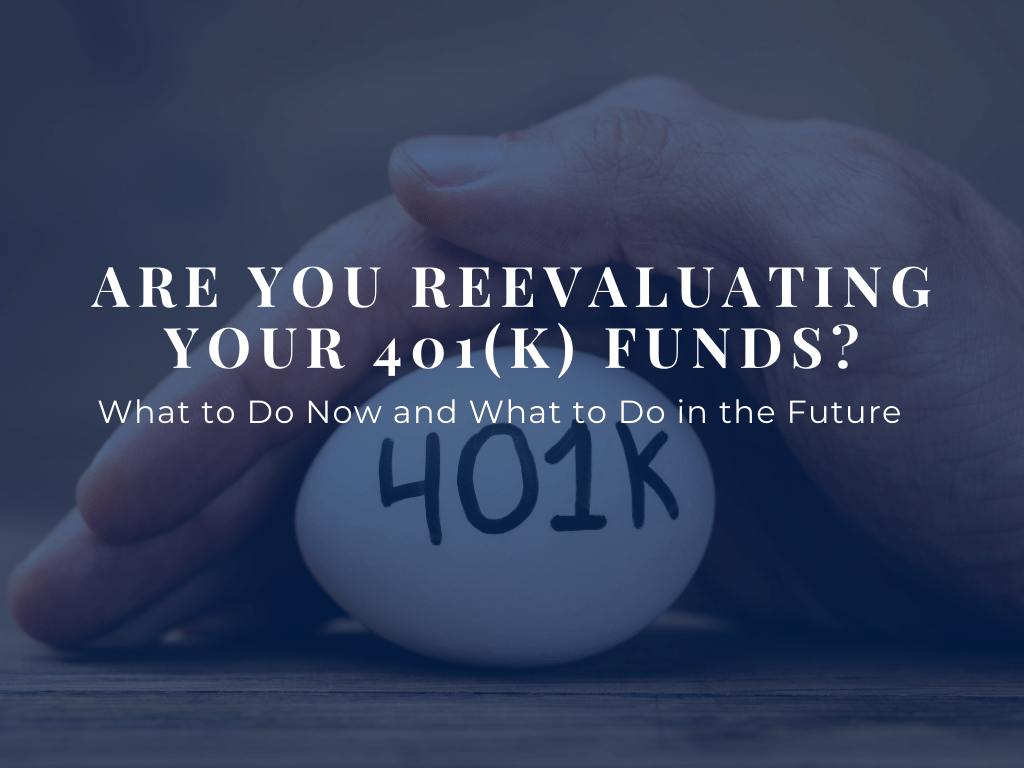
2020 is one for the record books. We have experienced dramatic market swings with the unprecedented drops in March, to the new highs and lows in October.
A few months ago, people were afraid to open and look at their 401(k) statement. The historical lows could not have hit at a worse time for first quarter statements. In early October, with the markets hitting new highs, people couldn’t wait to see the statements. Which leads us to the question: What do we advise people to do now?
Evaluating Your 401(k) Investment Choices in a Global Pandemic
As financial advisors, our job is to help calm the storm and to reassure people to stay the course in times of uncertainty. Our advice today is not different from our advice at the beginning of 2020. Your 401(k) is a long-term investment. Looking at it daily, weekly or even every three months is probably too much.
If you were to try to make a decision based on the January to March 2020 time frame you might have wanted to pull everything out of your 401(k); in fact many of our clients talked to us about this option. Our advice is not to try to time the market. Don’t make long-term decisions based on an event that is not on the same time frame. Your time frame is an individual decision based on your age and your planned retirement age. Answering investment questions requires an individual, in-depth consultation with your plan advisor.
Should I Move Out of Certain Types of Funds in My 401(k) Today?
It is important to be diversified based on your individual time frame. Interest rates are low, and we believe inflation will creep higher. Therefore it is important to be diversified with equities and bonds that will keep you on track to reach your retirement goals. Changing investments should be discussed at least annually with your financial advisor to make sure you are on the correct path.
Do You Recommend Target Date Funds in 401(k) Plans?
While target dates may be good for some as a “set it and forget it” fund; they do not introduce risk tolerance as a fundamental aspect of investing. To say that if you are 40 years old, you should be in the 2045 Target Date fund is not giving you credit for your individual circumstances.
At Carnegie, we are a custom shop and build diversified model portfolios based on each client's unique risk, circumstances and goals. We meet individual clients one-on-one to assess and recommend how they should be invested.
What Other Advice Do You Have for 401(k) Plans Today?
First and foremost when it comes to 401(k) plans, the most important thing is to start as early as you can. Statistics say to save 10-15% of your compensation in your 401(k) plan. Your goal should be to replace 70 to 80% of your income by the time you are ready to retire. Again, you have to base this on your individual circumstances; 15% may be too much for your budget to handle, but we strongly recommend that you invest enough to maximize your company’s match if you have this feature. Whether you have this available should be presented to you in your benefits meeting. If you do not know, ask your plan administrator for a copy of the Summary Plan Description (SPD) that legally, has to be made available to you.
Second, would be to start a rainy day fund. A rainy day fund is a four- to six-month emergency reserve that you may be able to rely on to meet the unexpected expenses that come your way. That way if your water heater blows or you suffer an unexpected job loss or layoff, you are setting yourself up to have the financial ability to weather the storm.
Third, don’t borrow or withdraw from your 401(k). It is very tempting to tap these funds and it has become increasingly easier to do, but beware. Withdrawing comes at a very high cost. If you are under 59 ½ there is a 10% penalty plus the funds are taxed, so if you are in a 25% tax bracket you will only realize 65% of your withdrawal. Borrowing may be better, but not by much. First you must pay the money back, but at a cost of missing out on asset accumulation based on the market advance.
Finally, talk to your advisor regularly. You may have access to an advisor who is attached to your plan, and you probably do not have to pay any extra to have that advisor give you advice about your financial needs.
Be sure to maximize this feature.
 About Our Author Kim Gannis, AIF®
About Our Author Kim Gannis, AIF®
Kim Gannis is Principal and Director of Retirement Services in our Pittsburgh office. Over 25 years of experience in employee benefits consulting allows Kim to oversee the plan sponsor services. Her responsibilities include plan governance, plan effectiveness and plan investment and monitoring.
Looking for a Financial Advisor for You?
If you are currently looking for help with financial planning, contact us. We are happy to schedule an introductory meeting at your convenience.
The opinions and recommendations expressed herein are those of Carnegie Investment Counsel. The material was prepared by or obtained from sources which we believe to be reliable, but accuracy is not guaranteed. Any opinions expressed herein are subject to change without notice and are not intended as a recommendation to purchase or sell a security. Past performance is no guarantee of future results. Investment advisory services are offered by Carnegie Investment Counsel, an SEC registered investment adviser. Registration as an investment adviser does not imply a certain level of skill or training. Carnegie does not provide legal, insurance, or tax services. For a detailed discussion of Carnegie Investment Counsel and its investment advisory services and fees, see the firm’s Form ADV on file with the SEC at www.adviserinfo.sec.gov



